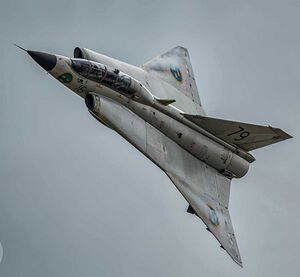Aestrup EF-105 Gripen: Difference between revisions
No edit summary |
No edit summary |
||
| Line 26: | Line 26: | ||
|} | |} | ||
The '''Aestrup EF-105 Gripen''' is a series of single-engined air superiority fighters designed by Aestrup Luftfahrtsselskab AB for the [[Acrean Air Force]]. First entering service in 1959, the Gripen formed a core component of Acrea's air defence forces until the 1970s | The '''Aestrup EF-105 Gripen''' is a series of single-engined air superiority fighters designed by Aestrup Luftfahrtsselskab AB for the [[Acrean Air Force]]. First entering service in 1959, the Gripen formed a core component of Acrea's air defence forces until the 1970s. With its double delta wing and Mach 2 capability, it was revolutionary at the time of its introduction and was one of the first true supersonic fighters in service. | ||
Although it began its service life in 1959, constant upgrades to the Gripen's peripheral and core systems, avionics, airframe, and powerplants kept it competitive well into its long service life. Owing to its delta wing, the Gripen earned a reputation as a supremely agile fighter, capable of extreme angles of attack. The later EF-105C variant first produced in the mid-late 1960s was the first aircraft in Acrean service to be fitted with a turbofan engine, drastically increasing the fuel efficiency of the aircraft. The Gripen was continuously updated with new avionics and weapons systems throughout its service life, and thus remained arguably the most capable air-to-air fighter in Acrea's inventory until the introduction of the [[Aestrup | Although it began its service life in 1959, constant upgrades to the Gripen's peripheral and core systems, avionics, airframe, and powerplants kept it competitive well into its long service life. Owing to its delta wing, the Gripen earned a reputation as a supremely agile fighter, capable of extreme angles of attack. The later EF-105C variant first produced in the mid-late 1960s was the first aircraft in Acrean service to be fitted with a turbofan engine, drastically increasing the fuel efficiency of the aircraft. The Gripen was continuously updated with new avionics and weapons systems throughout its service life, and thus remained arguably the most capable air-to-air fighter in Acrea's inventory until the introduction of the [[Aestrup EF 137 Valkyr|EF-137 Valkyr]], its replacement, in the early 1970s. | ||
==Development== | ==Development== | ||
Revision as of 07:58, 26 October 2021
| EF-105 Gripen | |
|---|---|

| |
| Acrean Air Force EF-105B2 | |
| Role | Air superiority fighter |
| National origin | |
| Manufacturer | Aestrup Luftfahrtsselskab AB |
| Design group | Aestrup Luftfahrtsselskab AB |
| First flight | 1955 |
| Introduction | 1959 |
| Retired | 1978 |
| Status | In service |
| Primary user | |
| Produced | 1958-1965 |
The Aestrup EF-105 Gripen is a series of single-engined air superiority fighters designed by Aestrup Luftfahrtsselskab AB for the Acrean Air Force. First entering service in 1959, the Gripen formed a core component of Acrea's air defence forces until the 1970s. With its double delta wing and Mach 2 capability, it was revolutionary at the time of its introduction and was one of the first true supersonic fighters in service.
Although it began its service life in 1959, constant upgrades to the Gripen's peripheral and core systems, avionics, airframe, and powerplants kept it competitive well into its long service life. Owing to its delta wing, the Gripen earned a reputation as a supremely agile fighter, capable of extreme angles of attack. The later EF-105C variant first produced in the mid-late 1960s was the first aircraft in Acrean service to be fitted with a turbofan engine, drastically increasing the fuel efficiency of the aircraft. The Gripen was continuously updated with new avionics and weapons systems throughout its service life, and thus remained arguably the most capable air-to-air fighter in Acrea's inventory until the introduction of the EF-137 Valkyr, its replacement, in the early 1970s.
Development
Design
Operational History
Variants
Operators
Former Operators
Specifications (EF-105C Block 66)
General Characteristics
- Crew: 1
- Length: 15.35 m (50 ft 4 in)
- Wingspan: 9.42 m (30 ft 11 in)
- Height: 3.89 m (12 ft 9 in)
- Wing Area: 49.2 sq. m (530 sq ft)
- Empty Weight: 7,865 kg (17,339 lb)
- Powerplant: MDA EJ-700 afterburning turbofan, 56.5 kN (12,700 lbf) thrust dry, 97.1 kn (21,800 lbf) reheat
Performance
- Maximum Speed: Mach 2 at altitude
- Service Ceiling: 20,000 m
Armament
- Guns: 2 x 30mm cannon with 400 rounds
- Payload: 6 external hardpoints for ordnance with a capacity of up to 2,900 kg, two additional hardpoints for drop tanks
See Also
- Aircraft of Comparable Role, Configuration, and Era
